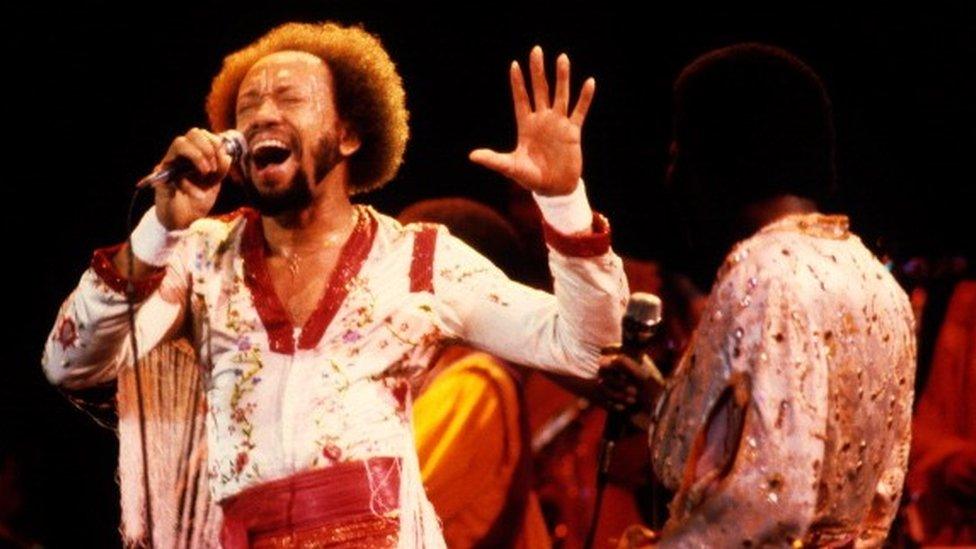Earth Wind & Fire: How Maurice White made a force for positivity
- Published
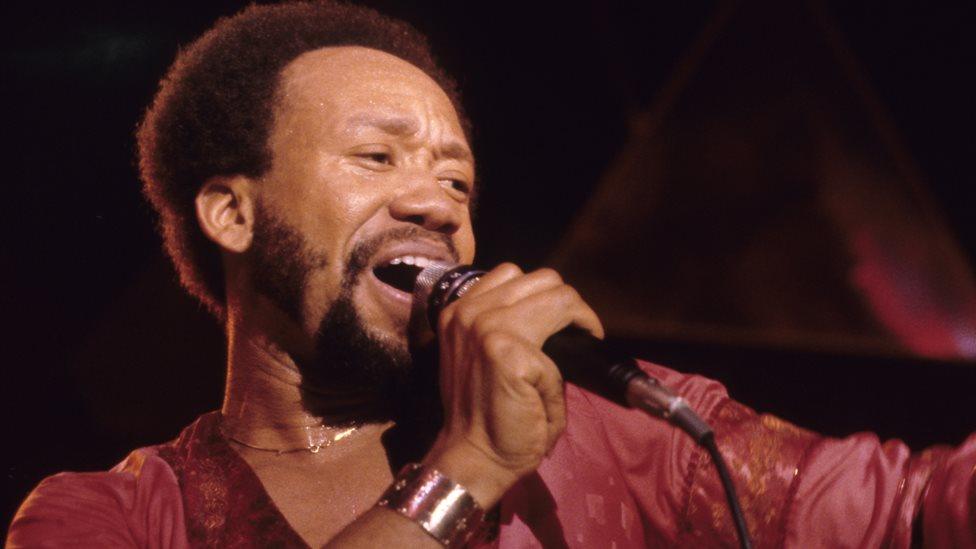
White's interests in Egyptology and mysticism informed the band's visual style
To understand Earth Wind & Fire, you just had to look at their song titles: Mighty Mighty, Happy Feelin', Boogie Wonderland.
They advocated positivity and harmony - expressed through the medium of funk.
"From my youngest days, I always felt certain affinities with the idea of being a preacher," said bandleader Maurice White, who has died at the age of 74.
"Being joyful and positive was the whole objective of our group. Our goal was to reach all the people and to keep a universal atmosphere. All of our songs had that positive energy. To create uplifting music was the objective."
Blending jazz, Latin and soul with an infectious rhythmic pulse, Earth Wind & Fire they sold more than 90 million albums around the world.
Several of their records went multi-platinum, and songs like September, external, Fantasy, external and After The Love Has Gone, external remain gold-plated disco classics.
Earth, Wind and Fire's September
One of the 1970's most accomplished live acts, they regularly featured 16 players on stage, all of whom could turn on a dime. They even incorporated pyrotechnics, lighting effects and magic tricks (floating pianos, disappearing acts) into their set. A young Michael Jackson could often be found in the audience, taking notes.
"We were playing highly sophisticated music, and we had to figure out a way to keep people's eyes on the stage," White recalled. "I figured if people were listening to something they hadn't heard before, we had to do exciting things."
White's death robs the band not just of their founder member, but their driving force - a musician who steered the band through multiple line-up changes, and honed their sound for crossover appeal. Even when Parkinson's disease robbed him of the ability to play in the 1990s, White took care of the band's business affairs, and devotedly guarded their legacy.
Announcing his death, White's brother and bandmate Verdine simply called him his "hero and best friend".
False starts
Born in Memphis on 19 December 1941, Maurice White was the son of a doctor and grandson of a New Orleans honky-tonk pianist.
He moved to Chicago with his family and sang gospel from a young age, but didn't learn to read music until he was 18, when he enrolled at the Chicago Conservatory of Music as a percussion scholar.
Upon graduating, he earned his stripes as a session drummer at Chess Records, playing for Etta James, Muddy Waters and Fontella Bass, before leaving to join popular jazz group The Ramsey Lewis Trio, where he learned to play the Kalimba - an African thumb piano that later featured on several Earth Wind & Fire hits.
"Ramsey helped shape my musical vision beyond just the music," White later recalled. "I learned about performance and staging."
In 1969, he struck out on his own, forming a songwriting partnership with keyboardist Don Whitehead and singer Wade Flemons, which evolved into a band called the Salty Peppers.
The group scored a local hit with the effervescent party track La La Time, external but when a follow-up flopped, he took his bandmates to Los Angeles, adding singer Sherry Scott to form the first version of Earth Wind & Fire, naming the group after the elements on his astrological chart.
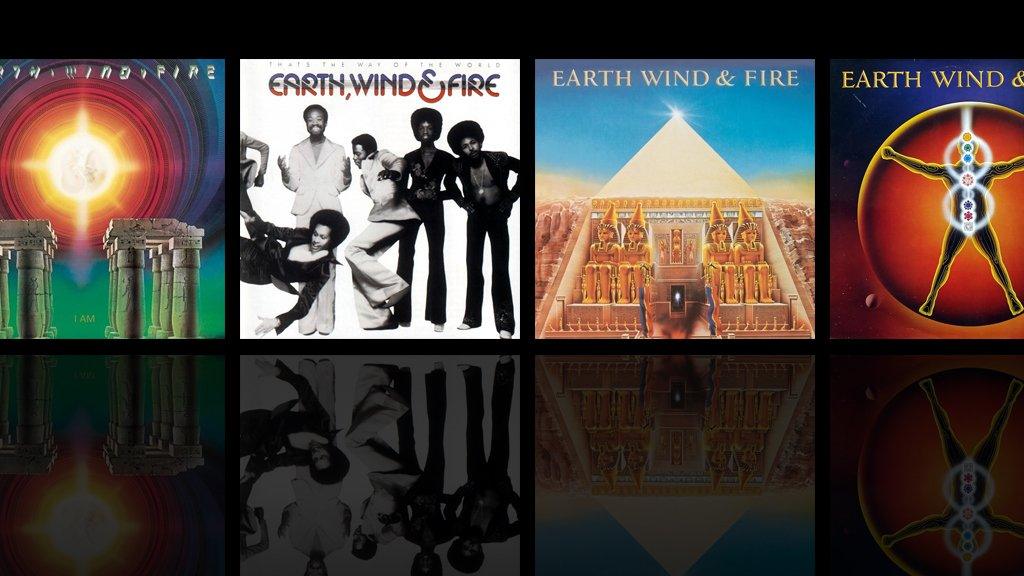
Breakthrough album, That's The Way of the World, was unusual for featuring the band on the cover
Critics found their first two albums intriguing but derivative - with many noting a heavy debt to Sly & The Family Stone.
"What they lack, though, is Sly's sense of derision and irony," said Rolling Stone in its review of their self-titled debut, external.
"The lyrics, unwisely printed inside, are as preachy and lovepeace cloying as anything Motown has done recently."
Taking note, White abandoned the line-up, save his brother, and formed a new band based around younger musicians - notably singing percussionist Philip Bailey, recruited from a Denver R&B outfit called Friends & Love.
It marked the beginning of the group's imperial phase. 1973's Head to the Sky brought new audiences while the 1974 follow-up, Open Our Eyes, was their first genuine hit.
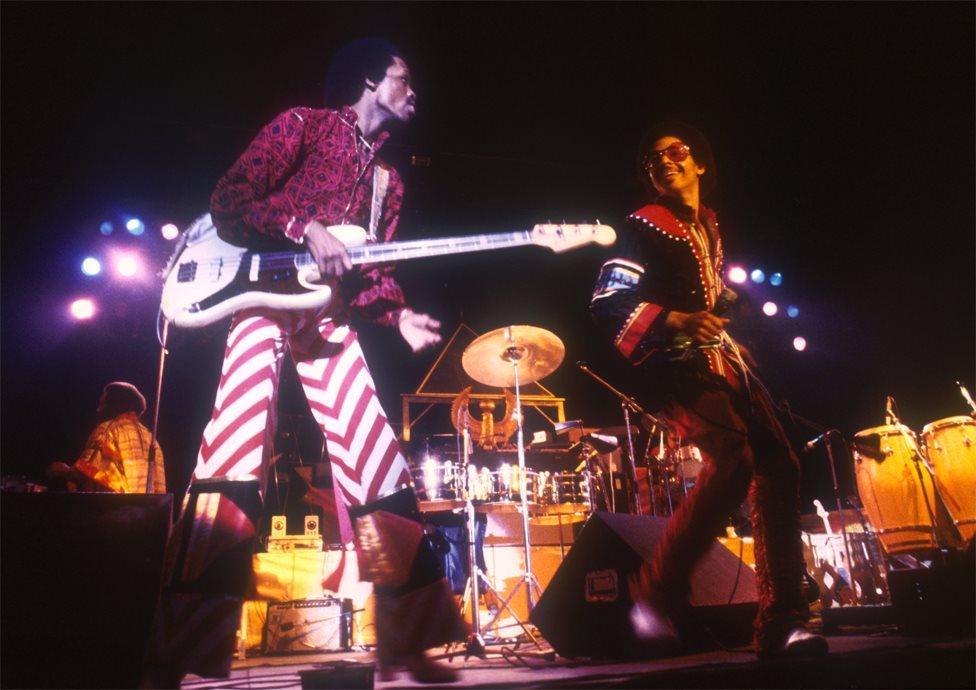
The band's elaborate stage shows paved the way for modern stadium acts
A year later, they scored their only number one single with the slinky, irresistible Shining Star, external.
The song came to White when he took a night-time walk in rural Colorado, where the band were recording their landmark 1975 album, That's the Way of the World.
Overwhelmed by the beautiful clarity of the night sky, he came up with the chorus - "Shining star for you to see / What your life can truly be" - and brought it to the rest of the band.
They spent days perfecting the track, with White and Bailey layering vocal upon vocal to create the stark a capella fade at the end of the song.
Speaking to MixOnline in 2004, external, the band said they had been determined to make a crossover hit.
"This was an important album - one that signaled whether we would go on and become a mainstream group or just be an R&B act," Verdine White said.
"At that particular time, they didn't really cross a lot of black acts over to mainstream radio. We already had two Gold albums but still, most of the mainstream didn't know who we were."
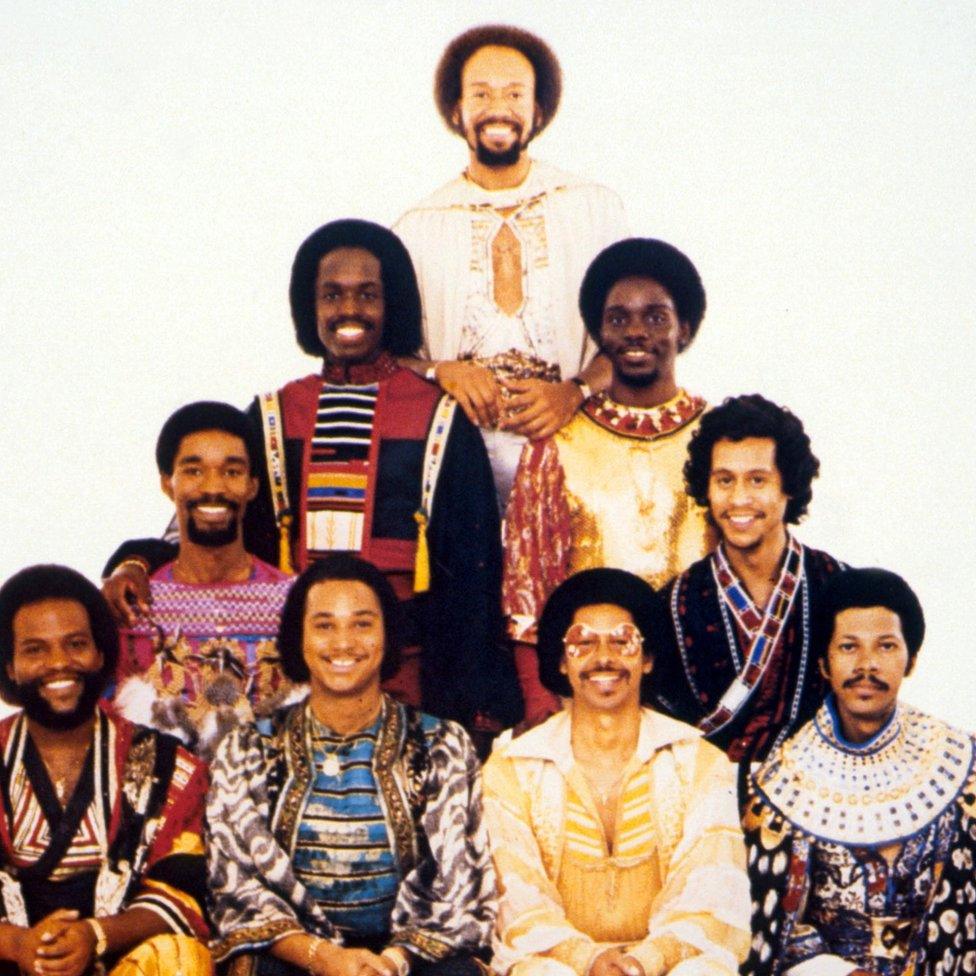
Line-ups changed throughout the band's career but Maurice and Verdine White remained constants
The success of the song, earned the band a Grammy nomination for best R&B vocal performance - but the band weren't enamoured with the ceremony.
"At the time, African-Americans didn't get their Grammys on television, so we didn't go," said White. "We didn't think too much about the awards. We just stayed focused on the music."
Positivity
By the end of the decade, the band was a regular presence on the pop charts, with melodic hits like After The Love Has Gone and Boogie Wonderland (a collaboration with The Emotions). Their 1978 greatest hits collection The Best of Earth, Wind & Fire, Vol. 1 sold five million copies in the US, and was their first top 10 record in the UK - thanks in part to a cover of The Beatles' Got to Get You into My Life.
They worked hard and toured hard, with White enforcing a zero tolerance policy on showbusiness excess.
"No, we don't deal in drugs in any way," he said in 1975. "It's not necessary if your spirit is clear and your mission is positive. Yes, it is true that a lot of entertainers don't follow these kind of guidelines - that is many times because they are in it for the wrong reasons."
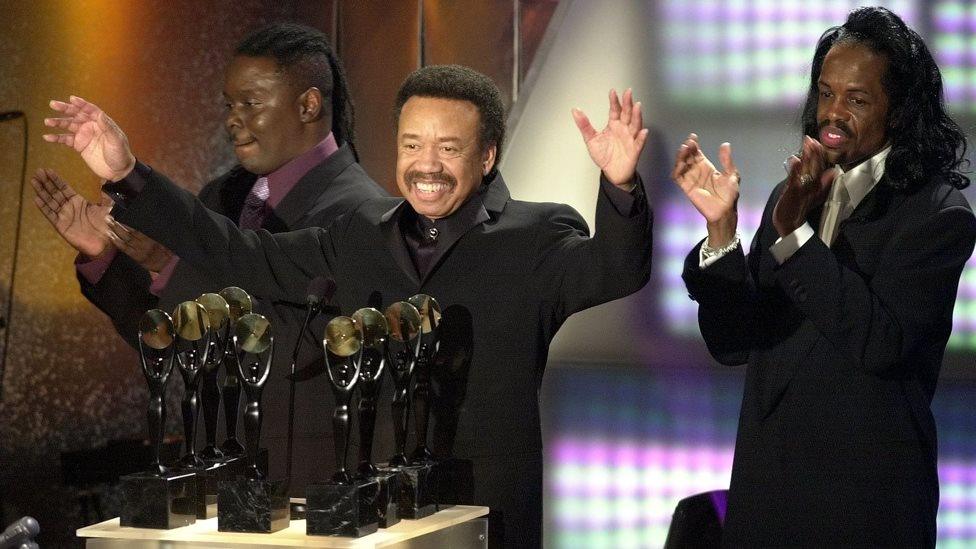
Earth Wind & Fire were inducted to the Rock and Roll Hall of Fame in 2000
After weathering the thinly-veiled racism of America's "Disco Sucks" movement, Earth Wind & Fire continued to score hits in the 1980s, adotping a new, electronic edge to keep up with prevailing musical trends.
But 1983's Electric Universe was an unexpected flop, and Philip Bailey embarked on a solo career - scoring a global hit with Easy Lover, his duet with Phil Collins.
That redressed an imbalance within the band, that allowed them to reform on a more equal footing in 1987.
"We were a little inhibited to say things for fear of bruising Maurice's ego," Bailey told the LA Times. "He was sensitive to the fact that we were growing up [musically] and that we were disenchanted about certain things. But he was still in the driver's seat to make decisions. It created a lot of tension."
The slimmed-down band scored yet another number one R&B single in 1987, System of Survival, and continue to tour and release albums to this day.
White had been battling Parkinson's disease since 1992, and announced his diagnosis in 2000, the same year the band were inducted to the Rock and Roll Hall of Fame.
But he remained a passionate advocate for his band, and their cosmic message.
"It's important to put the emphasis on the positive aspect," he told The Chicago Tribune. "I have learned that music helps a lot of people survive, and they want songs that can give them something - I guess you could call it hope."

- Published5 February 2016
